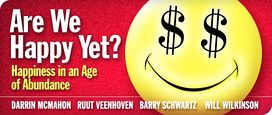I have to say that as a humanist, it is great fun to watch the high level exchange between Will and Barry from the sidelines. But their discussion raises a number of questions in my mind. Barry spoke of the importance of security as a desirable human end, and I have to say that on a personal level security is very appealing to me. But at the macroeconomic level, creating greater security — in the form of job guarantees, long-term unemployment insurance, subsidized medical care, and so forth — obviously can have the downside of stifling innovation, curbing growth, and limiting an economy’s ability to respond flexibly to changing conditions. I think of France as an example of a society that has achieved a laudable degree of security for its citizens, but at the cost of a certain degree of sclerosis — most notably high structural unemployment on the order of 9-10%.
Presumably Barry would argue that we can strive for a better balance between innovation and security than France, and no doubt many (including many French) would agree. But my question is this: Given that we know that unemployment is particularly hard on happiness, how would a policy maker, using the new happiness research, weigh between the happiness promoted by a high-growth economy with some insecurity and one that generates security at the cost of some growth? What I’m getting at is that it strikes me that weighing the pluses and minuses between these two general policy approaches would be very difficult, if not impossible, drawing solely on happiness data. Yes, one can compare different societies, but so many variables enter into the calculations here that identifying direct correlations is perilous. And so one is left in the end to make decisions based on other criteria, moral criteria, to adjudicate competing claims. That is perfectly fine, of course — in France nobody erected the welfare state by claiming that it would boost happiness. The talk rather was (and is) about justice: A moral society has an obligation to care for its needy and vulnerable, basic security is a social right, and other claims of this order.
That brings me to a related point, which Barry alluded to in passing: equality. Every study I’ve seen suggests that economic inequality doesn’t seem to have much of a bearing on happiness (though I stand to be corrected). That is perhaps surprising, and it is probably frustrating to some who would like to claim support in happiness research for policies favoring redistribution. I grant that one can make compelling arguments for the benefits of equality, though apparently not on happiness grounds. But that doesn’t seem to stop many who favor the new happiness research from also favoring greater equality, Barry apparently among them. Again, that is perfectly fine. But it does suggest to me that in some cases the new happiness research is being used somewhat selectively, or even as a way to give scientific credence to arguments that at bottom are really moral and political. In France in the next several weeks, the country will be having a presidential debate about what degree of security and equality is most desirable to the citizens of that country. They won’t be talking much about happiness. But perhaps that is more honest.

